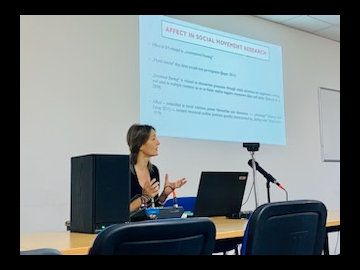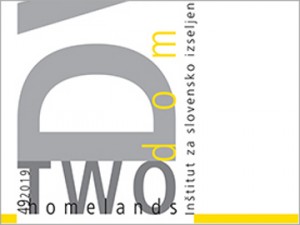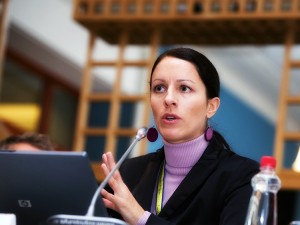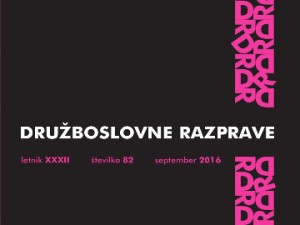Politicality of affects: framing migration through social movements’ mobilization of affective communication
14. 9. 2023 | Politics

 Mojca Pajnik participated at the ECPR conference (European Consortium for Political Research) in Prague (June 4-8, 2023) where she presented results of research on power and potential of affects and affective communication in actions of social movements from the field of migration and migrant rights. The paper, co-authored with Marko Ribać, discusses discoursive and affective strategies used by movements across ten selected European cities (from Aalborg to Palermo, and Hamburg to Maribor) to problematize exclusionary migration policies and point to potential social change. The paper is a result of the ongoing research project ECSEuro.
Mojca Pajnik participated at the ECPR conference (European Consortium for Political Research) in Prague (June 4-8, 2023) where she presented results of research on power and potential of affects and affective communication in actions of social movements from the field of migration and migrant rights. The paper, co-authored with Marko Ribać, discusses discoursive and affective strategies used by movements across ten selected European cities (from Aalborg to Palermo, and Hamburg to Maribor) to problematize exclusionary migration policies and point to potential social change. The paper is a result of the ongoing research project ECSEuro.
Abstract
The analytical current of researching emotions and affectivity has grown in the last decade, addressing the emotional social dynamics or the “affective turn” in “late capitalism”. The use of emotions and affects in social action have been theorized both as an opportunity to “revitalize” the relations between the individual and the community, as a helper to communities to face crisis, and also as a mechanism that might elevate tensions between the community and power holders. As argued by some (Richards 2007; Fominaya 2010; Papacharissi 2015) affects and emotions have the potential to mobilise resistance and create foundations for political action which makes them an important strategy for the promotion of democratic processes. This paper contributes to the theoretisation of the affective in the field of social movement analysis which has remained a neglected field of inquiry in the attempts towards “normalization of affects”, beyond the traditional binarisms (rational-emotional, public-private) in addressing social issues. Empirically, we draw our argument on the frame analysis we have conducted on public documents (statements and public letters, press releases and online materials) created by social movements in selected cities in 5 European countries (Denmark, Germany, Italy, Slovenia, Switzerland) on topics related to migration. First, we analyse how framings of perceived problems and solutions in the field of migration differ among cities and countries and which translocal links or interconnecting points can be identified. As we compare framing processes across multiple local sites and national or municipal contexts (detecting frame resemblance and / or difference) we explore translocal political potentials and networking opportunities that arise from compatible or divergent frame resemblances. Second, we’re interested if and to what an extent the documents exhibit affective communication, which distinct affects are used and how they form movement’s “affective discourse”, i.e. how emotions are attached to formulating problems and solutions in movements’ public appeals on migration and migration policy. The findings show that movements use different strategies in mobilizing affects, they engage in empathy and compassion with migrants on the one hand, and, on the other hand, they put forward anger and frustration when discussing harmful actions taken by state officials, contributing to “affective resemblance” among solidarity social movements. Analysing movements’ framing and affective discourses we aim at understanding “the politicality” of affective communication, to address the potential of affects as movements’ embodied discourses to articulate social change.




